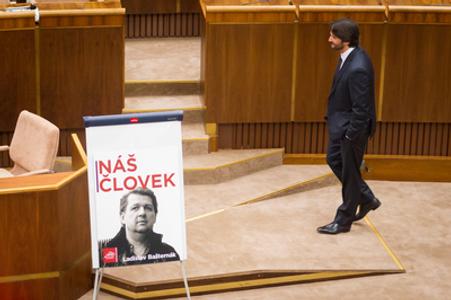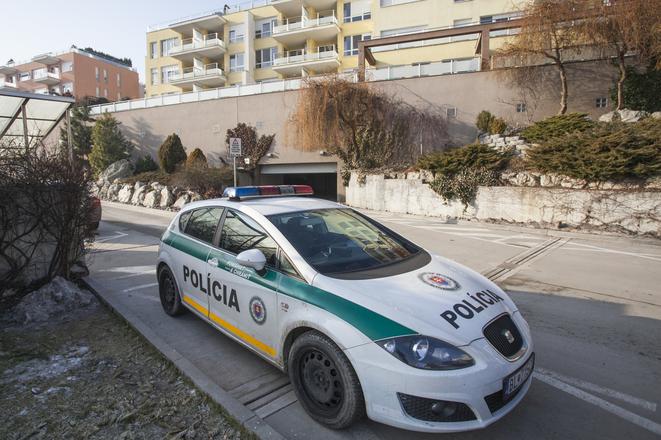When investigators asked businessman Ladislav Bašternák who is suspected of tax fraud how he paid €12 million for seven flats, he responded that he brought cash. If he would have used €500 banknotes, he would have to had at least three briefcases; if €100 banknotes, he would have needed at least twelve of them.
“Those were analogue times; times of cash,” commented Interior Minister Robert Kaliňák about Bašternák’s testimony. The interior minister too faces suspicions that he tried to stop the investigation in favour of Bašternák.
The Regional Prosecutor's Office in Bratislava was, however, interested in the €12 million and demanded that Bašternák bring documents to explain the cash. He brought them on January 19. The investigation is ongoing.
“After learning the material’s content the Regional Prosecutor's Office will consider next steps,” the office’s spokesperson Michal Šúrek told The Slovak Spectator on March 22.
While the prosecutor's office takes its time on the investigation, Bašternák gradually gets rid of his assets: of originally 19 companies, only five have been left in his portfolio. When he finally faces the court, his business could be so divided that the state would have nothing to take from him, the Sme daily reported.
Additionally, the legislation could also give Bašternák a chance, if proven guilty, to end the case without ending up in jail.
“Bašternák has great cards in his hands,” senior law lecturer Peter Kováč told Sme.
Moreover, even the police gave Bašternák an advantage when raiding his firms in mid February. Someone called officers off the raid and they were allowed to return only a few hours later, according to former elite police officer Jozef Lutter. He later quit the police and filed a criminal motion concerning the raid.
“Kaliňák has lost my respect,” he told the Denník N daily.

Avoiding courts
Bašternák’s firm BL-202, allegedly received excessive VAT refunds after it bought and sold seven apartments in the Five Star Residence complex built by tycoon Marián Kočner in 2012. Bašternák reportedly bought them for €12 million which is an excessive price, according to the criminal office at the Financial Administration.
The company then applied for a VAT refund of €2 million and the state paid it out, despite suspicions that the transaction was fictitious.
The real value of the property should be some €1.5 million. Thus, Bašternák would have illegally earned over €1.7 million on the deal.
Surprisingly, the investigator of the financial police department at the National Criminal Agency (NAKA) has charged businessman Ladislav Bašternák with not paying taxes and insurance, despite tax fraud being discussed since the start of the case.
Later, police chief Tibor Gašpar explained that NAKA had no other possibility because legislation in 2012 did not know crime of tax fraud.
In the case of the crime of not paying taxes, the courts give unethical businessmen the possibility to legally regret the act and pay unpaid taxes to avoid punishment. In 2011, the Constitutional Court (CC) approved that legislation allows for legally authorised regret of a crime, even tax fraud, to avoid jail, Sme writes.
The CC’s verdict does not seem right, nevertheless, Bašternák can refer to it when defending himself, according to Kováč.
“I presume the he will refer to the CC’s verdict and bring €2 million in cash to the tax office; ideally, [he will split the cash and come] two or three times,” Kováč told Sme, “in this way he will end the case with style.”
Cutting business
Another possibility for Bašternák to avoid penalties if proven guilty is to get rid of his companies and assets. This can help him in the court proceeding, as police scrutinise – among other things – how he acquired his assets.
If he fails to prove the origins of his property, it would be passed to the state. However, the loophole in the law enables him to free himself from this situation. If the court does not find sufficient assets to pay the tax and a potential fine, it can stop the proceeding, and Bašternák may escape.
Also Prosecutor General Jaromír Čižnár pointed to the problematic law in 2016 saying that it allows perpetrators enough time to get rid of their assets.
“Now the case goes to the court and it learns that the perpetrator divided his or her assets,” Čižnár then said, as quoted by Sme. “The court stops the proceeding because the value of the assets at the time of making [court’s] the decision is not high enough.”

Ties with Interior Minister
Since the beginning of the case, Kaliňák has been facing suspicions that he has been trying to stop the investigation in favour of Bašternák.
In summer 2016,an assistant of opposition MP Jozef Rajtár of Freedom and Solidarity (SaS), Filip Rybanič, took documents from the Tatra Banka bank which show that a sum of €260,000 was transferred to Kaliňák’s account from the B.A. Haus company that was operated by Bašternák. Similar payments were also made to the account of former transport minister Ján Počiatek who left politics in mid April.
Lutter and some opposition MPs stated that the transaction was a kickback for Kaliňák to halt the investigation of the case.
NAKA, however, decided in January 2017 that it would not launch an investigation of Kaliňák stating that it has no information that any of Bašternák’s companies received excessive VAT refunds. The special unit NAKA is part of the Interior Ministry led by Kaliňák.
It is questionable whether the current situation at the Interior Ministry allows for proper investigation of the case, according to Lutter who filed a criminal complaint related to a halted raid of the Vega plus firm, partially owned by Bašternák.
Jozef Lutter described the stopped raid in his criminal complaint: the police offer in charge described the event and reasoned the call-off by false pretense, that the address at Karadžičova 10 was meant only for post delivery, and thus it made no sense to carry out a raid there. This was not true, according to Lutter.
The raid was later made on the same day, led by the investigator of the case – but in the afternoon, when the moment of surprise had already passed.
Moreover, in an interview with Denník N, Lutter said that former sponsor of Smer and head of the financial police Bernard Slobodník told him twice not to be concerned about the investigation. One of the cases concerned Bašternák.
Police chief Gašpar responded by saying that the police raid was in accordance with the law. After arriving at the location, police officers realised that the owner or administrator of the place was not aware of the raid, therefore, they had to inform him or her.
Lutter responded that in such cases the police have to stay at the location and secure it until it is possible to enter.
“Imagine that there would be documents really important for criminal proceedings,” Lutter said, as quoted by Denník N. “Police officers can leave and the suspect can take out everything; then wait for the second [police] group to come in the afternoon.”



 (source: TASR)
(source: TASR)